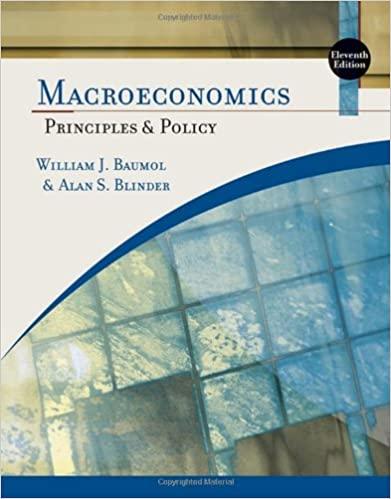Question
Quiz Question 1 Suppose the U.S. has a flexible exchange rate system and the Japanese demand for U.S. dollars increases.In this case the dollar will:
Quiz
Question 1
Suppose the U.S. has a flexible exchange rate system and the Japanese demand for U.S. dollars increases.In this case the dollar will:
Question 1 options:
depreciate.
appreciate.
Question 2
One of the long-run trends in the U.S. labor market is that the real wage has:
Question 2 options:
increased.
decreased.
remained relatively constant.
Question 3
Currently, the U.S. budget is:
Question 3 options:
a surplus.
a deficit.
balanced.
Question 4
Which of the following is not included in Ml?
Question 4 options:
Checkable deposits.
Savings deposits.
Traveler's Checks.
Currency in the hands of the public.
Question 5
Since the beginning of the pandemic, the Federal Reserve's target for the federal funds rate has:
Question 5 options:
increased.
decreased.
remained constant.
Question 6
During an expansion:
Question 6 options:
real GDP rises.
real GDP falls.
real GDP is always equal to trend real GDP.
Question 7
Given a demand-supply diagram, what must be true at equilibrium?
Question 7 options:
PS=QS
PD=QD
QS=QD
QS=PD=PS
Question 8
The difference between the real wage and the nominal wage is that the real wage is adjusted for changes in:
Question 8 options:
the money supply.
Output.
The price level.
Hours worked.
Question 9
A decrease in the money supply will cause the interest rate to:
Question 9 options:
increase.
decrease.
remain unchanged.
Question 10
Suppose that the nominal interest rate is 10% and the expected inflation rate is 2%.In this case the real rate of interest is:
Question 10 options:
12%.
8%.
2%.
5%.
Question 11
Suppose that steel prices go down.How would you expect the supply curve for cars to change?
Question 11 options:
The supply curve for cars shifts inward.
The supply curve for cars shifts outward.
The supply curve for cars does not shift.
Question 12
Which of the following factors may understate the level of unemployment?
Question 12 options:
Involuntary part-time employment.
Discouraged workers.
Underemployment.
All of the above.
None of the above.
Question 13
To increase employment, an appropriate short-run monetary policy would be:
Question 13 options:
an increase in government spending or a decrease in the tax rate.
a decrease in government spending or an increase in the tax rate.
an increase in the money supply.
a decrease in the money supply.
Question 14
Which type of unemployment arises because it takes time to move from one job to another?
Question 14 options:
Frictional unemployment.
Structural unemployment.
Cyclical unemployment.
Seasonal unemployment.
Question 15
When the U.S. government runs a budget deficit, national savings will:
Question 15 options:
increase.
decrease.
remained unchanged.
Question 16
Which of the following isnotone of conditions of being counted as part of the civilian labor force?
Question 16 options:
Being over 16 years of age.
Having looked for employment in the last 4 weeks.
Being under 65 years of age.
Being currently employed.
Question 17
What are the three main tools the Federal Reserve can use to control the money supply?
Question 17 options:
Open market operations, required reserve ratio, discount rate.
Open market operations, excess reserve ratio, federal funds rate.
Trade ratio, excess reserve ratio, discount rate.
Trade ratio, open market operations, federal funds rate.
Question 18
What is the Discount Rate?
Question 18 options:
The interest rate charged by financial institutions for loans made to other financial institutions.
The interest rate charged by the Federal Reserve on loans made to financial intermediaries.
An interest rate charged by banks for loans made to the general public.
The interest rate charged by the Federal Reserve when it conducts open market operations.
Question 19
In which type of exchange rate system is the exchange rate selected and maintained?
Question 19 options:
freely floating.
fixed.
managed float.
Question 20
In recent decades, the distribution of income in the U.S. has:
Question 20 options:
become more unequal.
become less unequal.
remained relatively constant.
Step by Step Solution
There are 3 Steps involved in it
Step: 1

Get Instant Access to Expert-Tailored Solutions
See step-by-step solutions with expert insights and AI powered tools for academic success
Step: 2

Step: 3

Ace Your Homework with AI
Get the answers you need in no time with our AI-driven, step-by-step assistance
Get Started


